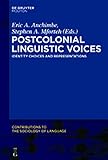Postcolonial Linguistic Voices : Identity Choices and Representations / ed. by Eric A. Anchimbe, Stephen A. Mforteh.
Material type: TextSeries: Contributions to the Sociology of Language [CSL] ; 100Publisher: Berlin ; Boston : De Gruyter Mouton, [2011]Copyright date: ©2011Description: 1 online resource (365 p.)Content type:
TextSeries: Contributions to the Sociology of Language [CSL] ; 100Publisher: Berlin ; Boston : De Gruyter Mouton, [2011]Copyright date: ©2011Description: 1 online resource (365 p.)Content type: - 9783110260663
- 9783110260694
- Anthropological linguistics
- Multilingual persons -- Social conditions
- Postcolonialism
- Sociolinguistics -- Psychological aspects
- Sociolinguistics
- Identität
- Postkolonialismus
- Soziolinguistik
- LANGUAGE ARTS & DISCIPLINES / Linguistics / General
- African Studies
- Language Contact
- Multilingualism
- Postcolonial Linguistics
- Social Anthropology
- Sociolinguistics
- 306.44
- P40 .P655 2011
- online - DeGruyter
- Issued also in print.
| Item type | Current library | Call number | URL | Status | Notes | Barcode | |
|---|---|---|---|---|---|---|---|
 eBook
eBook
|
Biblioteca "Angelicum" Pont. Univ. S.Tommaso d'Aquino Nuvola online | online - DeGruyter (Browse shelf(Opens below)) | Online access | Not for loan (Accesso limitato) | Accesso per gli utenti autorizzati / Access for authorized users | (dgr)9783110260694 |
Frontmatter -- Preface -- Contents -- Introduction -- Chapter 1. Postcolonial linguistic voices: Stitching together identity choices and their representations -- Part I. Postcolonial identities: Age, gender, ethnicity, and language -- Chapter 2. U r ma treasure bila measure. Identity construction in Kenya’s multilingual spaces -- Chapter 3. Gender and cultural identity in a television show in Botswana -- Chapter 4. The English language and the construction of a Cameroon anglophone identity -- Part II. Nationhood discourses: Language, policy, and politics -- Chapter 5. Nation-statehood and linguistic diversity in the postcolony: The case of Portuguese and indigenous languages in Mozambique -- Chapter 6. The emergence of an indigenous language as lingua franca: The case of Luganda in Uganda -- Chapter 7. Roles and identities in postcolonial political discourse in Cameroon -- Part III. Translating the postcolonial: Religion and lexicography -- Chapter 8. Contesting the sacred in Tamil: Missionary translations and Protestant scriptures in colonial South India -- Chapter 9. What mental images reveal about religious lexemes in Yoruba and English in present-day Nigerian churches -- Chapter 10. Foreign culture lexicography and beyond: Perspectives from the history of Igbo lexicography -- Part IV. Living the postcolonial: Local tongues in ex-colonial languages -- Chapter 11. Lexical gap, semantic incongruence, and the medium-of-learning effect: Evidence from Chinese-English code-switching in Hong Kong and Taiwan -- Chapter 12. Lamnso’ English: A study in ethnic variation in Cameroon English -- Part V. Colonising the coloniser: Ex-colonialist discourses and immigration -- Chapter 13. Postcolonial continuities in Danish monolingual dictionaries: Towards a critical postcolonial linguistics -- Chapter 14. Cape Verdean Creole in Lisbon: The young generation’s perspective -- Chapter 15. Code-switching among Igbo-Nigerian immigrants in Padua (Italy) -- Conclusion -- Chapter 16. Meeting of the exs: The ex-colonised meets the ex-coloniser -- Contributors -- Subject Index -- Author index
restricted access online access with authorization star
http://purl.org/coar/access_right/c_16ec
This volume investigates sociolinguistic discourses, identity choices and their representations in postcolonial national and social life, and traces them to the impact of colonial contact. The chapters stitch together current voices and identities emerging within both ex-colonized and ex-colonizer communities as each copes with the social, lingual, cultural, and religious mixes triggered by colonialism. These mixes, reflected in the five thematic parts of the book - 'postcolonial identities', 'nationhood discourses', 'translating the postcolonial', 'living the postcolonial', and 'colonizing the colonizer' - call for deeper investigations of postcolonial communities using emic approaches.
Issued also in print.
Mode of access: Internet via World Wide Web.
In English.
Description based on online resource; title from PDF title page (publisher's Web site, viewed 28. Feb 2023)


